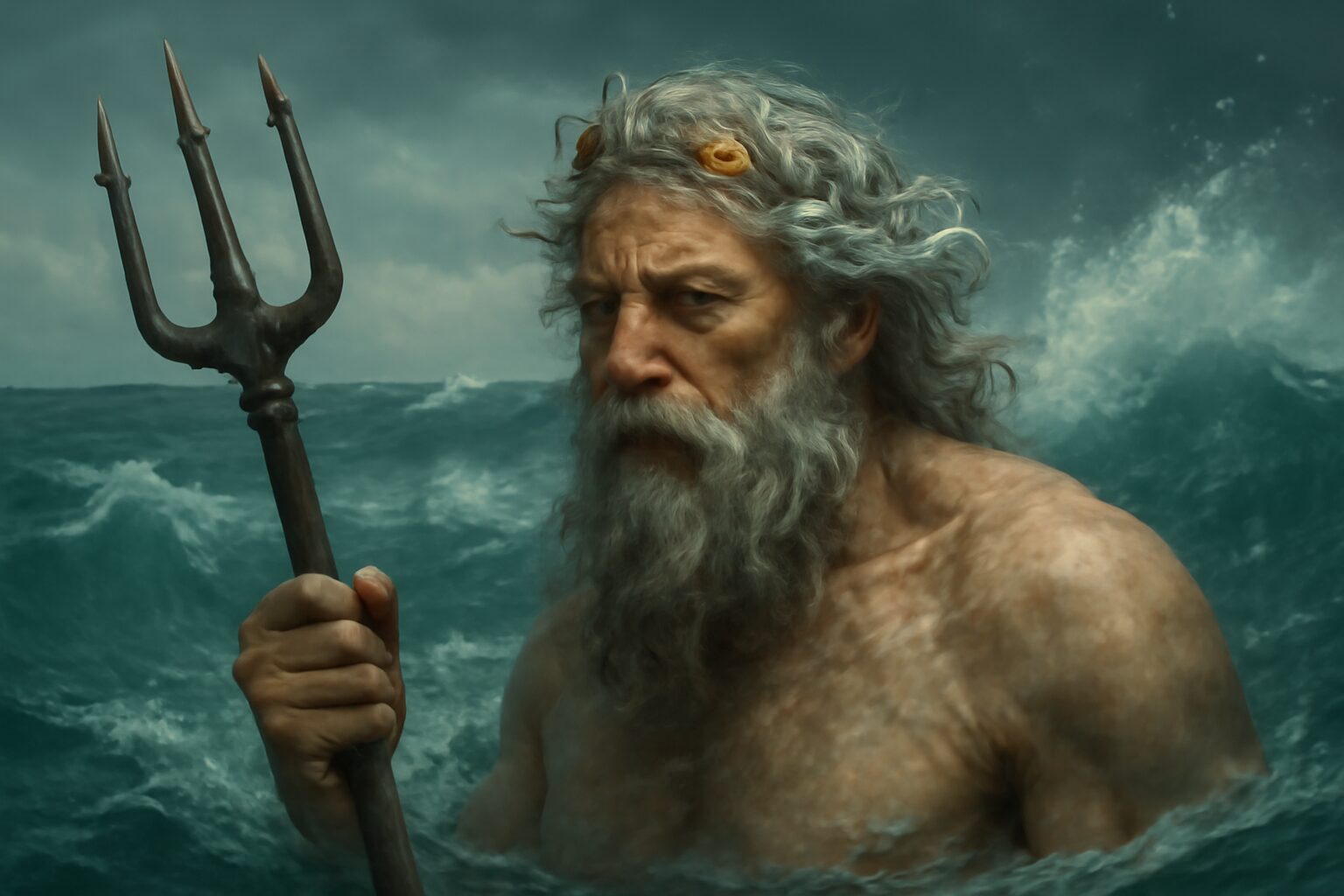Thaumas: The Marvel of the Sea
In Greek mythology, Thaumas (meaning "wonder" or "marvel") was a primordial sea deity, one of the ancient gods who ruled over the ocean's mysteries. As the son of Pontus (the Sea) and Gaia (the Earth), Thaumas embodied the awe-inspiring and often terrifying aspects of the deep, representing the wonders and dangers sailors encountered on their voyages.
Powers and Domain
Thaumas was associated with the sea's marvels, particularly its strange and mystical phenomena. Unlike Poseidon, who ruled the waves, Thaumas personified the uncanny and miraculous—whirlpools, sea monsters, and other inexplicable oceanic events. His name itself reflects the sense of wonder he inspired in mortals and gods alike.
Family and Relationships
Thaumas married Electra, an Oceanid nymph, and together they became the parents of some of mythology's most fascinating beings. Their children included the Harpies—winged spirits of sudden gusts and storm winds—and Iris, the rainbow goddess who served as a messenger for the Olympians. Through Iris, Thaumas was connected to the divine order, bridging the sea's mysteries with the heavens.
Significance in Greek Mythology
Though not as widely worshiped as other sea gods, Thaumas played a crucial role in the mythological world. His lineage linked the primordial forces of the sea to the more structured pantheon of Olympus. The Harpies, his fearsome daughters, appeared in myths like the torment of King Phineus, while Iris became an essential figure in divine communication.
Thaumas' legacy endures as a symbol of the sea's boundless enigma—reminding us that even in the age of reason, the ocean remains a realm of wonder and mystery.
Alternative Names for Thaumas
God Name: Thaumas (Roman)
In Roman mythology, Thaumas retains the same name as in Greek mythology, without a distinct Roman counterpart or alternative name. He is still referred to as Thaumas, maintaining his identity as a sea deity and the father of the Harpies and Iris.
God Name: Thaumasios (Greek (Epithet))
Thaumasios is an epithet sometimes associated with Thaumas in Greek mythology, emphasizing his wondrous or miraculous nature, derived from the Greek word 'thauma' meaning 'wonder' or 'marvel.'
Tales about Thaumas
The Marvel of the Sea and the Rainbow
In the vast, shimmering depths of the ocean, Thaumas, the god of sea wonders, once encountered Iris, the radiant goddess of the rainbow. Thaumas, whose name means "wonder," was captivated by the brilliant hues that danced around Iris as she descended from the heavens to the sea. He approached her with reverence, his own aquatic marvels paling in comparison to her celestial beauty.
A Divine Alliance
Iris, moved by Thaumas's genuine admiration, shared tales of her journeys between the realms of gods and mortals. In return, Thaumas revealed the hidden wonders of the ocean—bioluminescent creatures, coral forests that glowed with inner light, and schools of fish that moved like living silver. Their meeting was not just an exchange of stories but a fusion of sea and sky, wonder and color. From their alliance, it is said that the most breathtaking seascapes at dawn and dusk were born, where the ocean's marvels meet the sky's palette in a symphony of light.
Thaumas and the Harpy Sisters
Another tale tells of Thaumas's encounter with his own daughters, the swift and fierce Harpies: Aello and Ocypete. Known as the "snatchers," these winged deities of storm winds often brought chaos in their wake. Thaumas, embodying the awe-inspiring aspects of the sea, sought to temper their wild natures with his own sense of majestic wonder.
Father of Winds and Waves
One stormy evening, as the Harpies whipped the sea into a frenzy, Thaumas rose from the depths. Instead of chastising them, he showed them the beauty in controlled power—how the waves could carve magnificent cliffs and how the wind could carry seeds to fertile lands. Aello and Ocypete, struck by their father's wisdom, learned to balance their destructive impulses with the creation of new life and landscapes. This lesson forged a deeper bond between them, and ever since, the Harpies have been both feared and respected as forces of nature's dual nature—destruction and renewal.
Frequently Asked Questions
Who is Thaumas in Greek mythology?
Thaumas is a lesser-known sea deity in Greek mythology, often referred to as the god of the wonders of the sea. He is the son of Pontus (the Sea) and Gaia (the Earth), and is associated with the awe-inspiring and mysterious aspects of the ocean.
What is Thaumas known for?
Thaumas is primarily known for being the father of the Harpies and Iris, the rainbow goddess. His name means 'wonder' or 'miracle,' reflecting his connection to the extraordinary phenomena of the sea, such as storms and rainbows.
Why is Thaumas important in Greek mythology?
Thaumas represents the unpredictable and wondrous nature of the sea, which was both feared and revered by ancient Greeks. His lineage, including the Harpies and Iris, connects him to important mythological figures who symbolize natural forces and divine messages.
How does Thaumas relate to other sea gods like Poseidon?
While Poseidon is the chief god of the sea, Thaumas represents a more specific aspectu2014the wonders and mysteries of the ocean. He is part of an older generation of sea deities, highlighting the Greeks' layered understanding of the sea's power and beauty.
What can we learn from Thaumas today?
Thaumas reminds us of humanity's long-standing fascination with the sea's mysteries. His myths encourage appreciation for nature's wonders and the unknown, themes that remain relevant in modern explorations of the ocean and its ecosystems.













